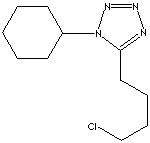PRODUCT IDENTIFICATION

H.S. CODE
TOXICITY
CLASSIFICATION
PHYSICAL AND CHEMICAL PROPERTIES
REFRACTIVE INDEX
Stable under ordinary conditions
APPLICATIONS
APPEARANCE
99.0% min
20ppm max
0.5% max
GENERAL DESCRIPTION OF TETRAZOLE
Oligonucleotide is a short DNA (deoxyribonucleic acid) or RNA (ribonucleic acid) sequence, typically made up of a few (2–20) covalently linked nucleotides. In molecular genetics, a short sequence synthesized to match a region where a mutation is known to occur, and then used as a probe for detecting complementary DNA or RNA. Oligonucleotides are currently used for genomic,proteomic and drug discovery technologies. Tetrazole is the traditional oligonucleotide synthesis activato for good coupling efficiency and to decrease the coupling times. But there are disadvantages of tetrazole; crystallisation problem from solution and potential explosive property at room temperature. Some alternatives have been recommended;
- 5-Ethylthio-1H-tetrazole [CAS RN: 89797-68-2]